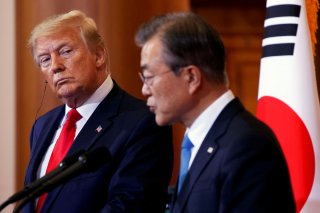Why America Needs to Conclude Alliance Cost Talks With South Korea Now
Can Washington get its priorities straight?
There is a glaring contradiction at the heart of the Trump administration’s approach. Trump and administration officials tell Seoul it must take on a greater share of the burden yet then attempt to forcefully dictate the process. They say Seoul should act like an ally, not a dependent, but then approach Seoul as though it were still a weak, war-torn client entirely dependent on its American patron. This approach misses the very important point that how something is done is often as important as what is done.
It is not unreasonable to ask Seoul to increase its financial contribution. Since the first SMA agreement in 1991, Seoul has covered the cost of the construction of logistics, military installations, and Korean workers who help U.S. Forces Korea (USFK). It is true that much of this ultimately cycles back into the local economy. Seoul could stand to increase its share of the burden beyond that. However, by demanding Seoul suddenly increase its payment by 300 percent (originally by 400 percent), while characterizing the U.S. contribution to South Korea’s defense as some sort of favor, the Trump administration dismisses Seoul’s already notable contributions and sidesteps the fact that the U.S. benefits from the alliance.
After seven rounds of failed talks, the U.S. furloughed nearly 4,500 Korean USFK employees. There is growing concern that the move has disrupted day-to-day USFK operations and affected the allies’ combined readiness posture amid Pyongyang’s push to refine its capabilities with multiple short-range rocket tests. It is not only bad optics, but also dangerous to continue such a stalemate amidst a global pandemic and what USFK Commander General Robert B. Abrams has officially designated a public health emergency.
Clearly, the Moon administration made a mistake earlier this month when, a day before the furlough, it leaked to the press that the allies' differences had “considerably” narrowed and the SMA talks were on the verge of completion. Seoul’s move to use the press to get ahead of America and force a closure to the talks is a well-worn tactic. It should have known it would not work with Trump, who rejected Seoul’s offer to increase its payment by 13 percent. Nevertheless, that leaves the allies uncertain what comes next. COVID-19 has not only disrupted their ability to meet in person, but is dominating the Trump administration's attention. Some fear the SMA talks are simply not a priority and could slide beyond America’s November election.
There is an inherent danger in simply criticizing Trump’s approach and touting the importance of the alliance. It risks overselling. Alliances are not innately valuable. Rather, they are valuable because of the purpose they serve. For certain, the U.S.-ROK alliance is based on a shared threat, but also on more positive factors. Indeed, it rests on more than specific tactics, contributions, or numbers (i.e. the means). It ultimately rests on the ends of the relationship, namely, in how well it promotes transparency, the rule of law, and shared democratic values.
In fact, Seoul’s remarkable handling of COVID-19 is a case in point, even more so when compared to Beijing. While the latter responded with disinformation and heavy-handedness, the former set a global standard with its rapid, coordinated and transparent response. As we traverse an increasingly unstable twenty-first century, marred by the threat of global pandemics and the rise of populist nationalism and great power confrontation, allies like Seoul are crucial. Not only does South Korea uphold values we hold dear as Americans, but often in a manner from which we can learn.
Dr. Clint Work is a Fellow with the Stimson Center, jointly appointed to its Security for a New Century program and 38 North. He will lead Senate-focused engagement on Korean peace and security and conduct research on U.S.-ROK and U.S.-DPRK affairs. Prior to joining Stimson, he was an assistant professor at the University of Utah’s Asia Campus in South Korea and the regular foreign policy writer for The Diplomat Magazine’s Koreas page. He holds a Doctorate in International Studies from the University of Washington and a Master’s in International Relations from the University of Chicago. Image: Reuters

